浙江省A9协作体2020-2021学年高一上学期期中联考英语试题 含答案
浙江省9+1高中联盟2020┄2021学年高一上学期期中联考英语试题
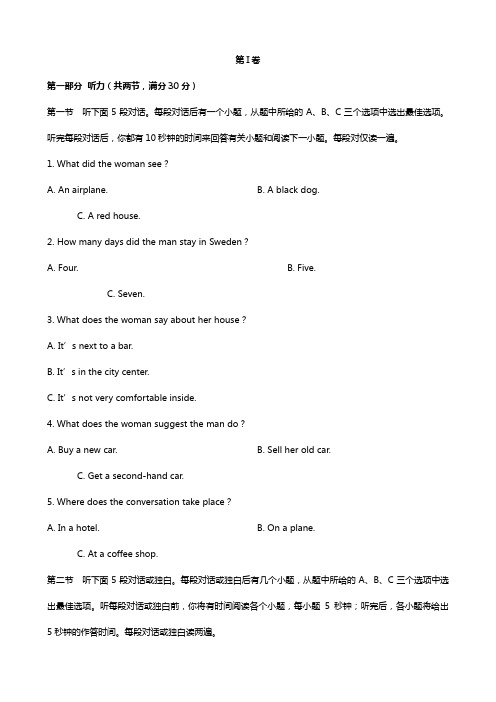
第I卷第一部分听力(共两节,满分30分)第一节听下面5段对话。
每段对话后有一个小题,从题中所给的A、B、C三个选项中选出最佳选项。
听完每段对话后,你都有10秒钟的时间来回答有关小题和阅读下一小题。
每段对仅读一遍。
1. What did the woman see?A. An airplane.B. A black dog.C. A red house.2. How many days did the man stay in Sweden?A. Four.B. Five.C. Seven.3. What does the woman say about her house?A. It’s next to a bar.B. It’s in the city center.C. It’s not very comfortable inside.4. What does the woman suggest the man do?A. Buy a new car.B. Sell her old car.C. Get a second-hand car.5. Where does the conversation take place?A. In a hotel.B. On a plane.C. At a coffee shop.第二节听下面5段对话或独白。
每段对话或独白后有几个小题,从题中所给的A、B、C三个选项中选出最佳选项。
听每段对话或独白前,你将有时间阅读各个小题,每小题5秒钟;听完后,各小题将给出5秒钟的作答时间。
每段对话或独白读两遍。
听第6段材料,回答第6、7题。
6. What is the man looking forward to the most?A. Playing games.B. Tasting the food.C. Seeing Donald Duck.7. What does the man ask the woman to do?A. T ake a photo of him.B. Help him find a suit.C. Drive him to Disneyland.听第7段材料,回答第8、9题。
2020-2021学年度高一上学期期中考试英语试卷及答案(含两套题)
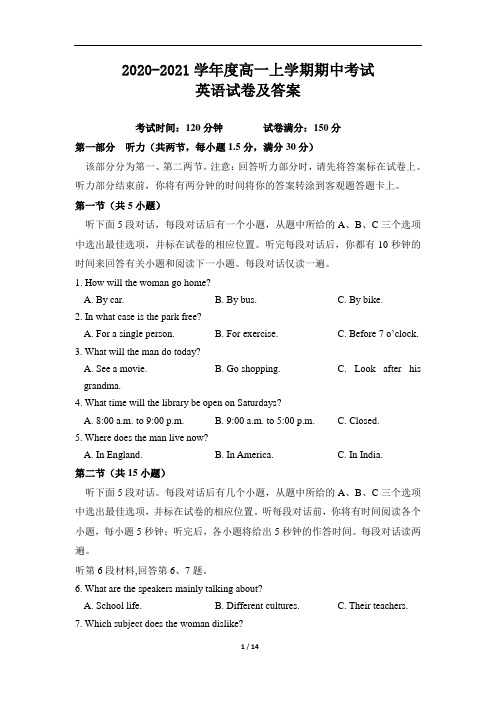
2020-2021学年度高一上学期期中考试英语试卷及答案考试时间:120分钟试卷满分:150分第一部分听力(共两节,每小题1.5分,满分30分)该部分分为第一、第二两节。
注意:回答听力部分时,请先将答案标在试卷上。
听力部分结束前,你将有两分钟的时间将你的答案转涂到客观题答题卡上。
第一节(共5小题)听下面5段对话,每段对话后有一个小题,从题中所给的A、B、C三个选项中选出最佳选项,并标在试卷的相应位置。
听完每段对话后,你都有10秒钟的时间来回答有关小题和阅读下一小题。
每段对话仅读一遍。
1. How will the woman go home?A. By car.B. By bus.C. By bike.2. In what case is the park free?A. For a single person.B. For exercise.C. Before 7 o’clock.3. What will the man do today?A. See a movie.B. Go shopping.C. Look after his grandma.4. What time will the library be open on Saturdays?A. 8:00 a.m. to 9:00 p.m.B. 9:00 a.m. to 5:00 p.m.C. Closed.5. Where does the man live now?A. In England.B. In America.C. In India.第二节(共15小题)听下面5段对话。
每段对话后有几个小题,从题中所给的A、B、C三个选项中选出最佳选项,并标在试卷的相应位置。
听每段对话前,你将有时间阅读各个小题,每小题5秒钟;听完后,各小题将给出5秒钟的作答时间。
每段对话读两遍。
听第6段材料,回答第6、7题。
6. What are the speakers mainly talking about?A. School life.B. Different cultures.C. Their teachers.7. Which subject does the woman dislike?A. History.B. English.C. Math.听第7段材料,回答第8、9题。
2020-2021学年度高一上学期期中考试英语试卷及答案(含两套题)
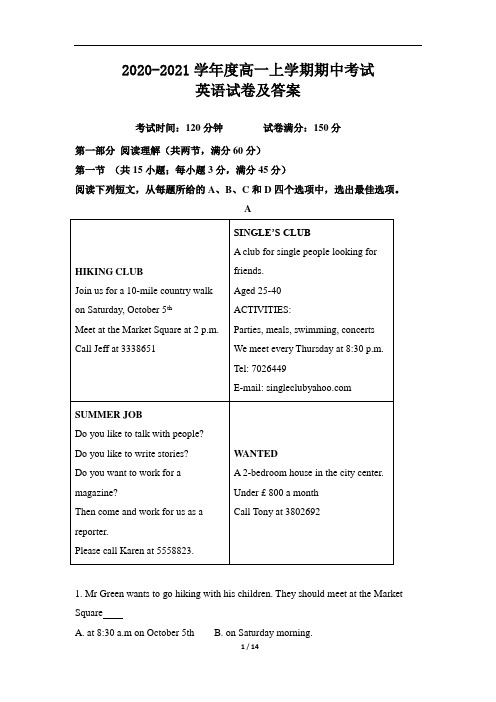
2020-2021学年度高一上学期期中考试英语试卷及答案考试时间:120分钟试卷满分:150分第一部分阅读理解(共两节,满分60分)第一节(共15小题;每小题3分,满分45分)阅读下列短文,从每题所给的A、B、C和D四个选项中,选出最佳选项。
A1. Mr Green wants to go hiking with his children. They should meet at the Market SquareA. at 8:30 a.m on October 5thB. on Saturday morning.C. At 2 p.m on October 5thD. on Sunday morning.2. Who can join the Singles’ Club ?A. A 10-year-old boy.B. A married woman of 25.C. Young parents.D. A 28-year-old single man.3. Alice wants to practice writing stories in her summer holiday. She had betterfor more information.A. make a phone call to KarenB. join the Hiking ClubC. send an e-mail to Singles’ cl ubD. call Tony at 3338651BI got into the teaching profession purely by choice. I was then in 9th grade when my mathematics teacher asked me to take on a class for a few students to whom the subject seemed difficult. And believe me, I enjoyed the entire teaching process. I never knew teaching would be so interesting. I loved my freshmen and was delighted to teach my so-called students who came up with lots of good questions.After my post-graduation, I worked as a software developer with a public sector(部门) in Bangalore for a few years. But I realized that no job could provide me with the satisfaction that I experienced while teaching and training. I always wanted to connect with a wider group of people. In fact, I felt it was a timely realization for me to choose the teaching profession. I applied to a few colleges, and finally I was chosen as a lecturer, and I had to lecture graduate and post-graduate students in a college.On the first day, I was nervous thinking that I had to teach the senior classes. But now I can say that giving lectures was one of the best experiences of my life. I was a Computer Science and Information Technology lecturer, but I tried to help my students with subjects that were not within my domain(范围). It was a new feeling to me every morning before I went to the classes. I used to feel energized and excited thinking that the class would be lit up with bright faces to greet me, “Good morning, Madam.”To me each day was a new beginning, with new feelings, new experiences andnew questions. I loved to explore their young minds and read their inquisitive (询问的) faces when a particular topic seemed hard. It was extremely challenging to motivate them to participate, think critically, question and also respect others’ points of view. Though few things never seemed easy, it was extremely exciting to make them believe that they really can. That is the reason I love to teach.4. From the first paragraph we know that____.A. the author's math teacher was often away from workB. the author became a real teacher in 9th gradeC. the author joined the teaching profession because she had toD. a great many questions were put forward by the author's “students”5. When the author worked as a software developer, she might feel______.A. interestedB. dissatisfiedC. nervousD. proud6. What can we learn about the author?A. She liked the students most who often challenged her to read.B. She was too nervous to speak a word in her first class.C. New feelings, experiences and questions made her feel each day new.D. She was unwilling to solve her students' questions out of her domain.7. What would be the best title for this text?A. Why I Love to TeachB. What My Life Is LikeC. How I Was Chosen as a LecturerD. My First Lesson as a TeacherCMore Americans expect to work past their 65th birthdays and never retire, says a recent study.The Associated Press with the NORC Center for Public Affairs Research surveyed 1,075 people, who were aged 50 and older. One-fourth of them said they never plan to retire. Among low-income earners in that age group this is even more true than for high-income earners.In America, the age of 65 is the traditional age to retire. Sixty percent of people aged 50 to 64 said they expect to work past their 65th birthday. More than half ofthose who are already older than 65 said they plan to keep working, too. They say they are working an average of 31 hours per week.Those 50 years of age or older said finances (财务) are the most important factor in the decision on when to retire. A majority of older workers — especially those who are 65 and older — plan to change their employers, or move into an entirely new profession, as they head into the later years.One-third of people earning less than $50,000 a year said they will keep working. About 20 percent of those who earn more than $100,000 said they will never retire.As baby boomers — people born between 1946 and 1964 — reach age 65, the United States’ general population will have more older people than ever before. The number of Americans 65 and older jumped 21 percent — or to 35.5 million —between 2002 and 2012. That number is expected to reach 92 million by 2060.8. What can we learn from Paragraphs 1&2 ?A. Low-income earners were more willing to continue working.B. High-income earners were not willing to work past 65.C. 1,075 people who were 50 took part in the study.D. Americans were not sure when to retire.9. Which of the following might most probably affect Americans’ retirement age?A. Their decision.B. Working hours.C. The money that they make.D. The traditional age to retire.10. What would happen in the career of most older workers?A. They would be paid less.B. They would change their jobs.C. They would earn more money.D. They would have a talk with employers.11. What is the main idea of this passage?A. America will have more older people.B. Older Americans have to work past 65.C. American people will have new jobs after 65.D. More Americans choose to work for more years.DDon’t be afraid! We are not encouraging people to steal. It’s one of the most popular topics currently talked about by people in cities, together with,“How many vegetables did you steal today?” or, “It’s harvest time for your peaches,” and,“I bought you a new car today.”Listening to a conversation like this, you do not have to feel strange. These people don’t really have their own farms or so much money that they can casually (随意地) buy someone else a car.They are just playing games on Social Networking Sites(SNS) like. Can you imagine millions of people in China spending lots of time on SNS playing games and talking to friends? This is especially true of white-collar workers in cities. Take for example — the number of current members has already hit 38 million.However, the large number of people using SNS highlights another problem. That is, lots of people choose to escape from reality. NSN just offers them a virtual(虚拟的) environment where they can escape from reality.Different games provide netizens with different experiences: dreaming, chatting and playing. It offers people the opportunity to escape from reality. But the virtual world is not the real one; no one can live in it forever, and reality is not as surfing on the Internet.Since this kind of social networking sites have become so popular, people have started to think about moving it into the real world. And as far as we know, a farmland of this kind exists in Shanghai where it has reached its first base.After playing the “Happy Farm” ga me on , would you like to put yourself among the real world while smelling the fragrances (芳香) of the countryside? Recently a farmland service called “Happy Farm in Reality” was opened in the suburbs of Shanghai where white-collar workers can experience the real farmers’ life for themselves.12. What’s the writer’s purpose for the first paragraph?A. To encourage readers to be brave.B. To tell the readers not to steal.C. To tell the readers some shocking news.D. To introduce some game.13. W hat does the underlined word “it” in Paragraph 5 refer to?A. The real world.B. Farmland in Shanghai.C. The virtual world.D. An expensive car.14. Which of the following is NOT true?A. Millions of people in China are spending lots of time on SNS.B. People steal vegetables on SNS for a living.C. Lots of people play games on SNS to escape from reality.D. White-collar workers can have the real farmers’ life.15. You can find the passage in the part of a newspaper.A. politicsB. entertainmentC. economyD. sports第二节(共5小题;每小题3分,满分15分)根据短文内容,从短文后的选项中选出能填入空白处的最佳选项。
2020-2021学年浙江省某校高一(上)期中英语试卷
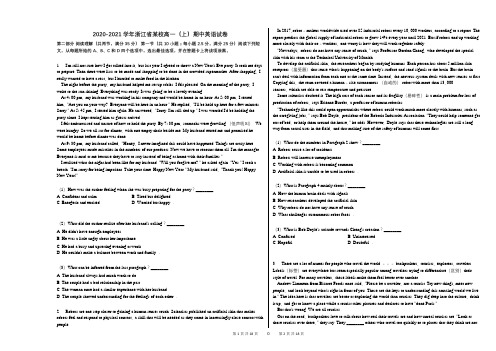
2020-2021学年浙江省某校高一(上)期中英语试卷第二部分阅读理解(共两节,满分 35 分)第一节(共 10 小题;每小题 2.5 分,满分 25 分)阅读下列短文,从每题所给的 A、B、C 和 D 四个选项中,选出最佳选项,并在答题卡上将该项涂黑。
1. I'm still not sure how I got talked into it, but last year I agreed to throw a New Year's Eve party. It took me days to prepare. Then there were lists to be made and shopping to be done in the crowded supermarket. After shopping, I really wanted to have a rest, but I hurried to make food in the kitchen.The night before the party, my husband helped me set up tables. I felt pleased. On the morning of the party, I woke to the sun shining. Everything was ready. It was going to be a lovely evening.At 4: 00 pm, my husband was working in his company and would be home in an hour. At 5: 00 pm, I texted him, "Are you on your way? Everyone will be here in an hour." He replied, "I'll be held up here for a few minutes. Sorry." At 5: 45 pm, I texted him again. He answered, "Sorry. I'm still tied up." I was worried I'd be holding the party alone. I kept texting him as guests arrived.I felt embarrassed and unsure of how to hold the party. By 7: 30 pm, stomachs were growling (低声吼叫). We were hungry. So we all sat for dinner, with one empty chair beside me. My husband texted me and promised he would be home before dinner was done.At 9: 30 pm, my husband called, "Honey, I never imagined this could have happened. Things are crazy here. Some employees made mistakes in the numbers of our products. Now we have to recount them all. I'm the manager. Everyone is mad at me because they have to stay instead of being at home with their families."I realized what the night had been like for my husband. "Will you forgive me? " he asked again. "Yes." I took a breath. "I'm sorry for being impatient. Take your time. Happy New Year." My husband said, "Thank you! Happy New Year!"(1)How was the author feeling when she was busy preparing for the party?________A. Confident and calm.B. Tired but delighted.C. Energetic and excited.D. Worried but happy..(2)What did the author realize after her husband's calling?________A. He didn't have enough employees.B. He was a little angry about her impatience.C. He had a busy and upsetting evening at work.D. He couldn't make a balance between work and family..(3)What can be inferred from the last paragraph?________A. The husband always had much work to do.B. The couple had a bad relationship in the past.C. The woman once had a similar experience with her husband.D. The couple showed understanding for the feelings of each other..2. Robots are one step closer to gaining a human sense: touch. Scientists published an artificial skin that makes robots feel and respond to physical contact, a skill that will be needed as they come in increasingly close contact with people. In 2017, robot﹣makers worldwide used over 85 industrial robots every 10, 000 workers, according to a report. The report predicts the global supply of industrial robots to grow 14% every year until 2021. But if robots end up working more closely with their co﹣workers, one worry is how they will work together safely."Nowadays, robots do not have any sense of touch, " says Professor Gordon Cheng, who developed the special skin with his team at the Technical University of Munich.To develop the artificial skin, the researchers began by studying humans. Each person has about 5 million skin receptors(接受器)that sense what's happening on the body's surface and send signals to the brain. But the brain can't deal with information from each one at the same time. Instead, the nervous system deals with new senses at first. Copying this, the team covered a human﹣size autonomous (自动的) robot with more than 13, 000sensors, which are able to test temperature and pressure.Some scientists doubted it. The high cost of each sensor and its fragility(易碎性) is a main problem for lots of production of robots, says Etienne Burdet, a professor of human robotics."Technology like this could open opportunities where robots could work much more closely with humans, such as the caregiving jobs, " says Bob Doyle, president of the Robotic Industries Association. "They could help someone get out of bed, or help them around the house, " he adds. However, Doyle says that these technologies are still a long way from actual uses in the field, and that making sure of the safety of humans will come first.(1)What do the numbers in Paragraph 2 show?________A. Robots cause a lot of accidents.B. Robots will increase unemployment.C. Working with robots is becoming common.D. Artificial skin is unable to be used in robots..(2)What is Paragraph 4 mainly about?________A. How the human brain deals with signals.B. How researchers developed the artificial skin.C. Why robots do not have any sense of touch.D. What challenges autonomous robot faces..(3)What is Bob Doyle's attitude towards Cheng's creation?________A. Confused.B. Uninterested.C. Hopeful.D. Doubtful..3. There are a lot of names for people who travel the world ﹣﹣﹣ backpackers, tourists, explorers, travelers. Labels(标签)are everywhere but seem especially popular among travelers trying to differentiate(区别)their style of travel. For many travelers, these labels make them feel better over another.Andrew Zimmern from Bizarre Foods once said, "Please be a traveler, not a tourist. Try new things, meet new people, and look beyond what's right in front of you. Those are the keys to understanding this amazing world we live in." The idea here is that travelers are better at exploring the world than tourists. They dig deep into the culture, drink it up, and get to know a place while a tourist takes pictures and declares to have "done Paris."But that's wrong. We are all tourists.Out on the road, backpackers love to talk about how real their travels are and how unreal tourists are. "Look at those tourists over there, " they say. They ________ others who travel too quickly or to places that they think are notwell worth visiting. However, they do so while eating hamburgers and drinking beers with other travelers.The only way to really get to know a place deeply is to live there. If you want to live like a local, find an apartment, get a job, go to work, and do the same things as you did back home.We are all only passing through a culture, getting a small taste before moving on to the next place. Even if we stay weeks or months, we're just getting in touch with the surface. As a matter of fact, we are all really just tourists, or explorers, or travelers. Call yourself whatever you want ﹣﹣﹣ it's all the same as we're all trying to do the same thing ﹣﹣﹣ see the world.So don't label anyone and don't let anyone label you. We're all tourists. We're all travelers. What we are all doing is more important than what we call ourselves. Let's just enjoy the fact that we are simply people on the road.(1)The mention of Andrew Zimmern's words is to________.A. present amazing experiencesB. differentiate travelers from touristsC. give an example of misunderstandingD. get to know different kinds of people.(2)Which of the following can best replace the underlined phrase "scoff at" in Paragraph 4?________A. Laugh at.B. Get along with.C. Take notice of.D. Wait for..(3)What do tourists and travelers have in common?________A. They live like locals while traveling.B. They enjoy tasty food on the way.C. They have a brief experience of places.D. They like calling themselves explorers..(4)What does the author suggest in the passage?________A. Dig deep into the culture.B. Just enjoy the trip.C. Make a careful trip plan.D. Do important things..第二节(共 5 小题;每小题 2 分,满分 10 分)根据短文内容,从短文后的选项中选出能填入空白处的最佳选项。
2020届浙江省9 1高中联盟高三上学期期中考试英语试卷及解析
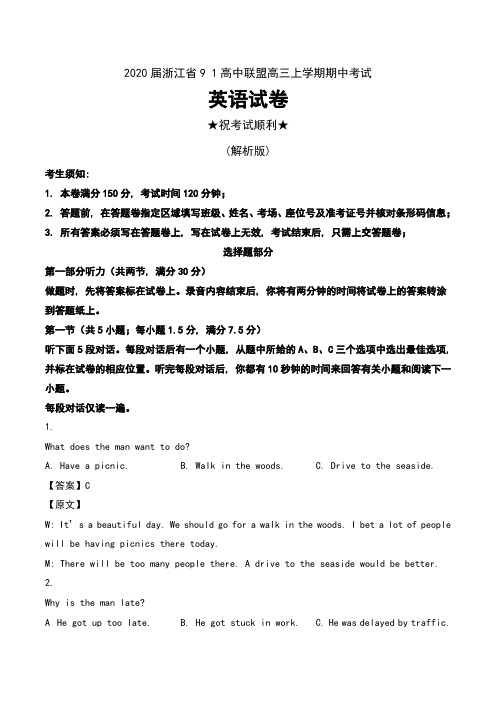
2020届浙江省9 1高中联盟高三上学期期中考试英语试卷★祝考试顺利★(解析版)考生须知:1. 本卷满分150分, 考试时间120分钟;2. 答题前, 在答题卷指定区域填写班级、姓名、考场、座位号及准考证号并核对条形码信息;3. 所有答案必须写在答题卷上, 写在试卷上无效, 考试结束后, 只需上交答题卷;选择题部分第一部分听力(共两节, 满分30分)做题时, 先将答案标在试卷上。
录音内容结束后, 你将有两分钟的时间将试卷上的答案转涂到答题纸上。
第一节(共5小题;每小题1.5分, 满分7.5分)听下面5段对话。
每段对话后有一个小题, 从题中所给的A、B、C三个选项中选出最佳选项, 并标在试卷的相应位置。
听完每段对话后, 你都有10秒钟的时间来回答有关小题和阅读下一小题。
每段对话仅读一遍。
1.What does the man want to do?A. Have a picnic.B. Walk in the woods.C. Drive to the seaside. 【答案】C【原文】W: It’s a beautiful day. We should go for a walk in the woods. I bet a lot of people will be having picnics there today.M: There will be too many people there. A drive to the seaside would be better. 2.Why is the man late?A He got up too late. B. He got stuck in work. C. He was delayed by traffic.【答案】C【原文】W: Where have you been? I have been waiting here for ages.M: I got out of bed early and set off on time but then the bus got stuck in traffic. W: Sounds like you’re not to blame.3.What does the man want to do with the TV?A. Sell it.B. Mend it.C. Throw it away.【答案】B【原文】M: I need a new plug for the TV. My TV is old but I like it and it still works well. W: I think you should throw it away and buy another, but it is up to you.4.Where are the speakers probably?A. In a restaurant.B. In a supermarket.C. In a cafe.【答案】A【原文】M: This place is a bit expensive, isn’t it?W: I know. Look at the price of the wine. It only costs a quarter as much at the supermarket.M: Never mind. It’s our anniversary. Order whatever you want. I think I’ll have the steak.5.When is John’s flight due?A. At 1:00 p.m.B. At 3:00 p. m.C. At 5:00 pm【答案】C【原文】M: Maybe I should set off for the airport now. John’s plane will arrive soon. He asked me to collect him in the car.。
2020-2021学年度高一上学期期中考试英语试卷及答案

2020-2021学年度高一上学期期中考试英语试卷及答案考试时间:120分钟试卷满分:120分第一卷(共85分)第一部分听力(共20小题,每题1分,满分20分)第一节听下面5段对话。
每段对话后有一个小题,从题中所给的A、B、C三个选项中选出最佳选项。
听完每段对话后,你都有10秒钟的时间来回答有关小题和阅读下一小题。
每段对话仅读一遍。
1. What color book does the man want?A. The red one.B. The blue one.C. The black one.2. What did the woman do on her vacation?A. She went for a bike ride.B. She relaxed on the beach.C. She cooked a fancy dinner.3. When does the man have breakfast on weekends?A. At about 9:00.B. At about 10:00.C. At about 11:00.4. What will Lisa do after school?A. Go home directly.B. Come to Tim’s house.C. Stay late to do homework.5. What does the woman say about her house?A. It’s next to a bar.B. It’s in the city center.C. It’s not comfortable inside.第二节听下面5段对话或独白。
每段对话或独白后有几个小题,从题中所给的A、B、C三个选项中选出最佳选项。
听每段对话或独白前,你将有时间阅读各个小题,每小题5秒钟;听完后,各小题将给出5秒钟的作答时间。
每段对话或独白读两遍。
2020-2021学年度高一上学期期中考试英语试卷及答案(含两套题)
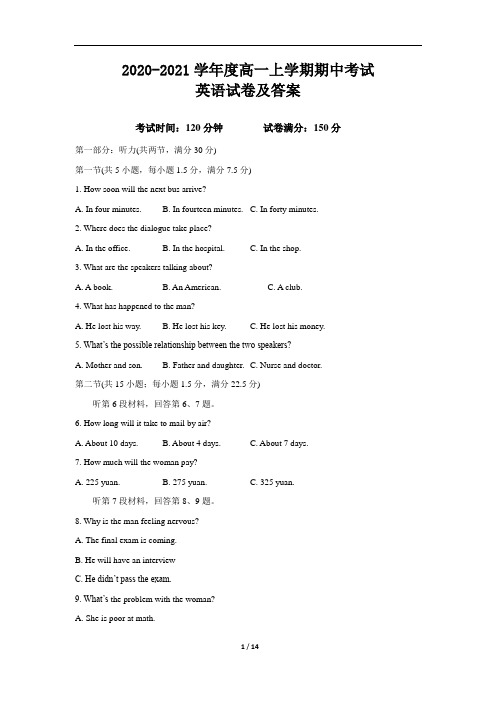
2020-2021学年度高一上学期期中考试英语试卷及答案考试时间:120分钟试卷满分:150分第一部分:听力(共两节,满分30分)第一节(共5小题,每小题1.5分,满分7.5分)1. How soon will the next bus arrive?A. In four minutes.B. In fourteen minutes.C. In forty minutes.2. Where does the dialogue take place?A. In the office.B. In the hospital.C. In the shop.3. What are the speakers talking about?A. A book.B. An American.C. A club.4. What has happened to the man?A. He lost his way.B. He lost his key.C. He lost his money.5. What’s the possible relationship between the two speakers?A. Mother and son.B. Father and daughter.C. Nurse and doctor.第二节(共15小题;每小题1.5分,满分22.5分)听第6段材料,回答第6、7题。
6. How long will it take to mail by air?A. About 10 days.B. About 4 days.C. About 7 days.7. How much will the woman pay?A. 225 yuan.B. 275 yuan.C. 325 yuan.听第7段材料,回答第8、9题。
8. Why is the man feeling nervous?A. The final exam is coming.B. He will have an interviewC. He didn’t pass the exam.9. What’s the problem with the woman?A. She is poor at math.B. She is afraid to speak in public.C. She has little job experience.听第8段材料,回答第10至12题。
2020-2021学年度高一上学期期中考试英语试卷及答案(含三套题)
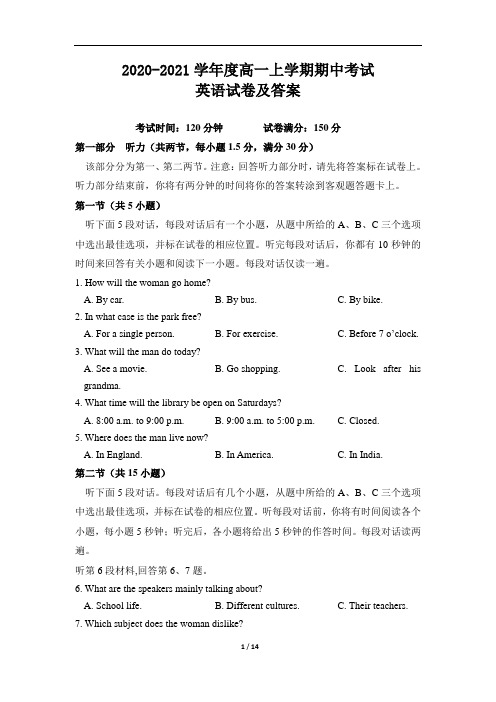
2020-2021学年度高一上学期期中考试英语试卷及答案考试时间:120分钟试卷满分:150分第一部分听力(共两节,每小题1.5分,满分30分)该部分分为第一、第二两节。
注意:回答听力部分时,请先将答案标在试卷上。
听力部分结束前,你将有两分钟的时间将你的答案转涂到客观题答题卡上。
第一节(共5小题)听下面5段对话,每段对话后有一个小题,从题中所给的A、B、C三个选项中选出最佳选项,并标在试卷的相应位置。
听完每段对话后,你都有10秒钟的时间来回答有关小题和阅读下一小题。
每段对话仅读一遍。
1. How will the woman go home?A. By car.B. By bus.C. By bike.2. In what case is the park free?A. For a single person.B. For exercise.C. Before 7 o’clock.3. What will the man do today?A. See a movie.B. Go shopping.C. Look after his grandma.4. What time will the library be open on Saturdays?A. 8:00 a.m. to 9:00 p.m.B. 9:00 a.m. to 5:00 p.m.C. Closed.5. Where does the man live now?A. In England.B. In America.C. In India.第二节(共15小题)听下面5段对话。
每段对话后有几个小题,从题中所给的A、B、C三个选项中选出最佳选项,并标在试卷的相应位置。
听每段对话前,你将有时间阅读各个小题,每小题5秒钟;听完后,各小题将给出5秒钟的作答时间。
每段对话读两遍。
听第6段材料,回答第6、7题。
6. What are the speakers mainly talking about?A. School life.B. Different cultures.C. Their teachers.7. Which subject does the woman dislike?A. History.B. English.C. Math.听第7段材料,回答第8、9题。
2020-2021学年度高一上学期期中考试英语试卷及答案(含三套题)
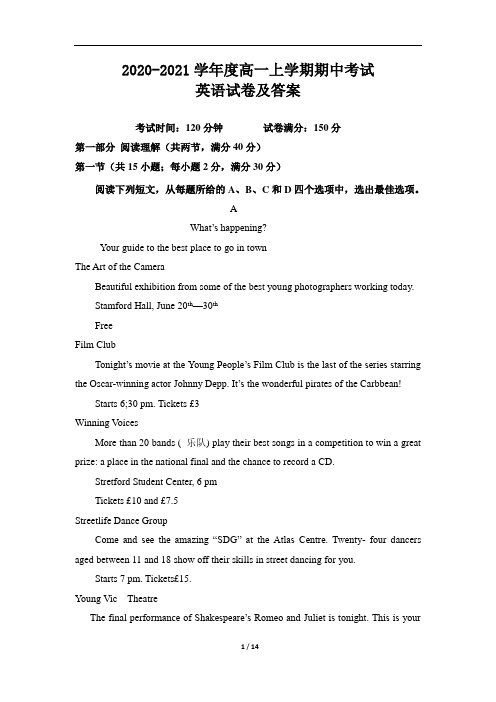
2020-2021学年度高一上学期期中考试英语试卷及答案考试时间:120分钟试卷满分:150分第一部分阅读理解(共两节,满分40分)第一节(共15小题;每小题2分,满分30分)阅读下列短文,从每题所给的A、B、C和D四个选项中,选出最佳选项。
AWhat’s happening?Your guide to the best place to go in townThe Art of the CameraBeautiful exhibition from some of the best young photographers working today.Stamford Hall, June 20th—30thFreeFilm ClubTonight’s movie at the Young People’s Film Club is the last of the series starring the Oscar-winning actor Johnny Depp. It’s the wonderful pirates of the Carbbean!Starts 6;30 pm. Tickets £3Winning V oicesMore than 20 bands ( 乐队) play their best songs in a competition to win a great prize: a place in the national final and the chance to record a CD.Stretford Student Center, 6 pmTickets £10 and £7.5Streetlife Dance GroupCome and see the amazing “SDG” at the Atlas Centre. Twenty- four dancers aged between 11 and 18 show off their skills in street dancing for you.Starts 7 pm. Tickets£15.Young Vic TheatreThe final per formance of Shakespeare’s Romeo and Juliet is tonight. This is yourlast chance to see this wonderful play. Don’t miss it.Starts 8 pm. Tickets £9, £7 and £5.5021. What can we learn about the Art of the Camera?A. It lasts half a monthB. It shows some old photosC. It is open to the public for freeD.It is held by 24 young artists22. Where can you watch street dancing ?A. At the Atlas CentreB.In Stamford HallC. At Young Vic TheatreD. At Stretford Student Centre23. If John only has £4, what could he do?A. See Romeo and JulietB.Watch Winning V oicesC.Watch Streetlife Dance GroupD. See Pirates of the CaribbeanBA long time ago, there was a farmer who had ten donkeys(驴). One evening, after a long day of hard work, the farmer returned home with the donkeys and began to tie them to the stakes(桩). When he finished nine donkeys, he found that the tenth rope was gone.What now? He could not let the last donkey run around all night. It would surely run away. Suddenly, he saw that, under a tree, there was a monk(和尚). The farmer ran to the monk and asked for voice. The monk said, “The only thing you have to do to the tenth donkey is make the movements(动作) you would have made with a rope in your hands. Pretend (假装) to tie the donkey. That’s all.”The farmer returned to the tenth donkey, pretended to fasten(拴紧) a rope around its neck and then to tie the rope to a stake. He then entered his little house, half trusting the monk’s advice, half worried that his donk ey would run away in the middle of the night.When he went outside very early the next morning, all the donkeys were still standing nicely next to their stakes, even the tenth one. The farmer untied the donkeys and wanted to take them to the field. But to his surprise, donkey number ten refused to move an inch. The farmer pulled and shouted but the animal just didn’t move.Suddenly, the farmer thought of what he had done to the donkey the night before. With a great “ah ha”, he returned to donkey number ten,and just after a simple movement the donkey happily walked with him to the field.24. What was the farmer’s problem when he tied the donkey?A. He needed one more rope.B. The tenth stake was gone.C. The tenth donkey ran away.D. He had left a rope in the field.25. Following the monk’s advice, what did the farmer do?A. He pretended to tie the tenth donkey.B.He went to sleep straight.C. He watched the tenth donkey all night.D. He tied the tenth donkey to the ninth stake.26. What did the farmer find in the next morning?A. All the donkeys were gone.B. The tenth donkey didn’t run away.C. Donkey number ten was running around.D. The donkeys went to the field by themselves.27. What does the underlined part“ a simple movement”refer to?A. Taking away the tenth stake.B. Pretending to untie the donkey.C. Pretending to cut the tenth rope.D. Trying the tenth donkey with a real rope.CFirst Lady Michelle Obama is a big fan of volunteering. V olunteering means working for free to help someone else. Mrs. Obama says volunteering is very important. “It should be part of everyone’s life, ” she says.Many teens agree. They say that helping others feels great and makes a difference. These days, more teens volunteer than work for pay. Teens clean up parks, walk dogs at animal shelters , visit the elderly and more.Some cities ---- including Seatle, Chicago, and Washingtong,D.C. ----require high school students to volunteer. Students must volunteer in order to graduate. Thestudent volunteers learn new skills and help their communities .Many parents are in favor of the idea ---- they say volunteering helps teens build job skills. But most teens don’t want to be forced to volunteer. They say they are busy. And they say voluntee ring is only fun if it’s a choice.Read both sides of the debate and decide.YESV olunteering can help teens get into college or get a job.Many cities and towns need help. V olunteers can help keep important programs going.Not all teens will volunteer if it isn’t required. Schools should repuire students to do all they can to get ready for adult life.NOMost teens are already very busy with classes, homework, jobs and sports. Forcing them to do more isn’t fair.It should be up to each person. Helping out doesn’t feel as good if you have to do it.Finding a volunteer job isn’t always easy. Students shouldn’t be kept from graduating because of something they can’t control.28. The writer mentions Michelle Obama in order to ,A. explain what volunteering isB. show she enjoys volunteeringC. tell what she does for the US D . introduce the topic of the text29. According to the text, in Chicago, .A. more people would rather work for payB. finding a volunteer job is quite easyC. volunteering is a must for high school studentsD. college students have to volunteer before graduation30. The underlined part “are in favor of “in the text means” .A. dropB. developC. likeD.catch31. Which question does the text mainly discuss?A. Is volunteering good for students?B.Which volunteer jobs shouldstudents do?C. What is the best time to volunteer?D. Should students be required to volunteer?DCoffee is an important part of Italian culture and since arriving here over six months ago, I have drunk a lot of it!Of course, coffee is also very popular in the UK but coffee culture in Italy is completely different. In Italy, when you order a coffee in a cafe or bar(酒吧), you are served with a tiny, bitter espresso. This is “normal (正常的) coffee” for Italians and they are not so interested in the huge coffees that we drink in the UK. If you want more than one sip(小口) of coffee in Italy, lungo is a good choice. In addition, while takeaway coffee is quite popular among Brits, it is not very common at all in Italy. Generally, Italians prefer to drink their tiny coffees while standing at the bar and, for many, this short break is an important part of their day.Usually, breakfast in a bar in Italy -includes a coffee and a pastry (酥皮糕点). Cappuccinos are very popular at breakfast time and, for me, a creamy cappuccino and a pastry with chocolate is the perfect way to start the day.Finally, I have found that coffee in Italy, such as espresso or macchiato (an espresso with a drop of milk), is so much cheaper than coffee in the UK. They are small, of course, but this means that in Italy it is possible to go out for coffee every day without breaking the bank.32.How is Paragraph 2 mainly developed?A.By time.B. By space.C. By comparisonD.By example.33.Which coffee will you get in Italy if you order one without special instructions?A. Espresso.B. Lungo.C. Cappuccino.D. Macchiato.34.What can we learn about the coffee culture in Italy?A.Takeaway coffee is very popular among Italians.B.Italians are very often seen drinking huge coffees.C.Few Italians take short breaks from work for coffee.D.Coffees are often served along with pastries during breakfasts.35.What does the author think of Italian coffee?A.She loves its bitter taste.B.It is too expensive for her.C.The cup it is served in is too small.D.It is a good choice for breakfast.第二节(共5小题;每小题2分,满分10分)根据短文内容,从短文后的选项中选出能填入空白处的最佳选项。
2020届浙江省9+1高中联盟高三上学期期中联考英语试题及答案解析
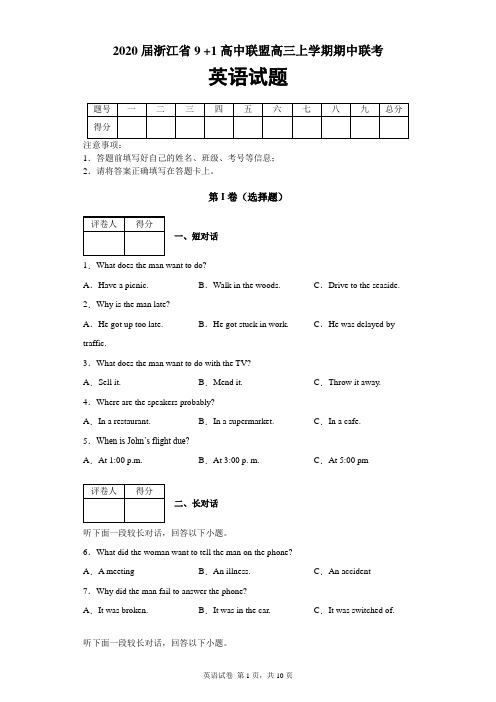
2020届浙江省9 +1高中联盟高三上学期期中联考英语试题注意事项:1.答题前填写好自己的姓名、班级、考号等信息;2.请将答案正确填写在答题卡上。
第I卷(选择题)一、短对话1.What does the man want to do?A.Have a picnic. B.Walk in the woods. C.Drive to the seaside. 2.Why is the man late?A.He got up too late. B.He got stuck in work. C.He was delayed by traffic.3.What does the man want to do with the TV?A.Sell it. B.Mend it. C.Throw it away. 4.Where are the speakers probably?A.In a restaurant. B.In a supermarket. C.In a cafe. 5.When is John’s flight due?A.At 1:00 p.m. B.At 3:00 p. m. C.At 5:00 pm二、长对话听下面一段较长对话,回答以下小题。
6.What did the woman want to tell the man on the phone?A.A meeting B.An illness. C.An accident 7.Why did the man fail to answer the phone?A.It was broken. B.It was in the car. C.It was switched of. 听下面一段较长对话,回答以下小题。
8.How many bedrooms are there in the house?A.One. B.Two. C.Three.9.What is the probable relationship between the speakers?A.Strangers. B.Roommates. C.Neighbors.听下面一段较长对话,回答以下小题。
浙江省A9协作体2020-2021学年高一上学期期中联考英语试题
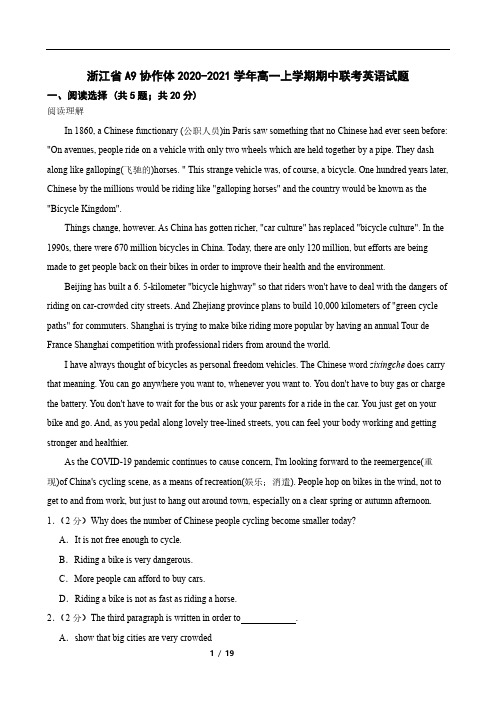
浙江省A9协作体2020-2021学年高一上学期期中联考英语试题一、阅读选择 (共5题;共20分)阅读理解In 1860, a Chinese functionary (公职人员)in Paris saw something that no Chinese had ever seen before: "On avenues, people ride on a vehicle with only two wheels which are held together by a pipe. They dash along like galloping(飞驰的)horses. " This strange vehicle was, of course, a bicycle. One hundred years later, Chinese by the millions would be riding like "galloping horses" and the country would be known as the "Bicycle Kingdom".Things change, however. As China has gotten richer, "car culture" has replaced "bicycle culture". In the 1990s, there were 670 million bicycles in China. Today, there are only 120 million, but efforts are being made to get people back on their bikes in order to improve their health and the environment.Beijing has built a 6. 5-kilometer "bicycle highway" so that riders won't have to deal with the dangers of riding on car-crowded city streets. And Zhejiang province plans to build 10,000 kilometers of "green cycle paths" for commuters. Shanghai is trying to make bike riding more popular by having an annual Tour de France Shanghai competition with professional riders from around the world.I have always thought of bicycles as personal freedom vehicles. The Chinese word zixingche does carry that meaning. You can go anywhere you want to, whenever you want to. You don't have to buy gas or charge the battery. You don't have to wait for the bus or ask your parents for a ride in the car. You just get on your bike and go. And, as you pedal along lovely tree-lined streets, you can feel your body working and getting stronger and healthier.As the COVID-19 pandemic continues to cause concern, I'm looking forward to the reemergence(重现)of China's cycling scene, as a means of recreation(娱乐;消遣). People hop on bikes in the wind, not to get to and from work, but just to hang out around town, especially on a clear spring or autumn afternoon. 1.(2分)Why does the number of Chinese people cycling become smaller today?A.It is not free enough to cycle.B.Riding a bike is very dangerous.C.More people can afford to buy cars.D.Riding a bike is not as fast as riding a horse.2.(2分)The third paragraph is written in order to .A.show that big cities are very crowdedB.suggest that China is trying to support bike-ridingC.give some examples that cities are better places to ride a bikeD.tell us that Shanghai has more professional riders than Beijing3.(2分)From the last paragraph, we can know that .A.the writer likes bike-ridingB.cycling is a good way to enjoy lifeC.riding gives us a sense of freedomD.cycling is a good way to fight disease4.(8分)阅读理解Fang Husheng is a bright, lively, 82-year-old woman from Beijing who is learning to use a smartphone, but it's been a struggle. "Technology advances so fast. What is supposed to make life easier is instead causing problems for us old people," she says.Fang grew up in a simpler age when you had to actually leave your house to shop, buy a train ticket or make a doctor's appointment. Now all of these things can be done with a smartphone and, in some cases, only with a smartphone. Recently an elderly man in Dalian was unable to travel on the subway because, to enter the subway, his QR health code needed to be scanned. "What is a QR code?" the man asked. "I have money to buy a ticket, why do I need a smartphone?" In the end, he left the station, feeling confused and embarrassed.I can certainly sympathize with (同情) Fang and the man from Dalian. They have spent their entire lives contributing to society and now they feel excluded from that society. But what can be done? One group of volunteer college students is trying to help. They are called See Young and they help the elderly learn how to use smartphones. However, teaching old folks about smartphones is only one part of the problem.Many older people have physical and health issues. Poor eyesight makes reading characters on small screens difficult. And "leathery fingers" (it means their fingers are less sensitive) make it hard to use touch screens.There are about 255 million elderly people in China and by 2030, one quarter of the population will be over 60 years of age. New technology and new solutions are going to be needed to make sure that these old folks aren't left by the side of the road as the rest of society races past.(1)(2分)The first paragraph is used to .A.to show the fast development of technologyB.tell us the usage of a smartphoneC.describe the old woman's situationD.attract the readers' interest in the article(2)(2分)Why didn't the old man travel on the subway?A.He didn't buy a ticket.B.He had no smartphone.C.He was not healthy enough.D.He didn't want to be scanned.(3)(2分)Which of the following is the closest in meaning to the underlined phrase "feel excluded from"?A.feel ignored by B.feel focused on byC.feel respected from D.feel kept out of(4)(2分)What's the main idea of the passage?A.Old people are slow to learn to use smartphones.B.There will be many more old people in the near future in China.C.Greater help should be provided to help the old learn new technology.D.Physical and health reasons make it difficult for the old to use new technology.5.(6分)阅读理解The journey of self is often nothing more than an exercise in patience and in the management of expectations. Many years ago, I was getting ready to leave home for college. I had the hope that I could finally answer the questions that had been bothering me since the beginning days of my high school years: what did I want to do; who did I want to be; what would make my life truly meaningful? I felt certain that I would be picking up the answers along the way. And there was this belief that the me who had spent many a day thinking over such things would one day suddenly pop out from his chrysalis (蝶蛹)like a caterpillar (毛毛虫) does when it becomes a butterfly. But alas, my change from caterpillar to butterfly was like being stuck in an endless queue for a ride at a Disney park. It took me a long time to realize that there is no such thing as a fast-pass in life.——DaisyThe journey of self is often nothing more than a tug-of-war (拔河)match between who we see ourselves to be, and how others view us. I had been considerably shy growing up, and often had trouble talking with new people. This made my high school years even more difficult as I had moved from my hometown and had registered in three different high schools over that period of time. It was at this time that I started tofollow my own interests and to better understand and develop my own sense of self. However, the self is in fact partly formed by how others see us. There is a natural tension (矛盾)between our inner sense of self, and how other people see us. The general rule is that the truer you remain to your internal sense of self, the more likely it is that people will like and admire you.—Emily(1)(2分)What does the underlined sentence mean?A.It's not easy to understand oneself truly.B.The writer doesn't like being kept waiting.C.The years the writer spent in the high school were long and hard.D.The experience of waiting in the park is an exercise in patience.(2)(2分)According to Emily, which is the most important in the life journey?A.Staying true to oneself.B.Having one's own interest.C.Understanding what others think of you.D.Enjoying experiences in different schools.(3)(2分)What do Daisy and Emily have in common?A.Neither of them cares much about others.B.Neither of them had a happy high school life.C.Both of them took a negative attitude to high school life.D.Both of them reflect on their own life deeply.二、任务型阅读 (共1题;共5分)6.(5分)任务型阅读Have you ever tried skiing? Skis are long, mostly flat pieces of metal, wood, or plastic. Skiers attach them to their shoes and use them to get over snow, often down a mountain slope. Nordic skiing and Alpine skiing are major events of the Winter Olympic.Nordic skiing started in Norway and other countries of north Europe. Cross-country skiing takes place on open, hilly land. A cross-country skier must be able to ski uphill, downhill, and cross flat areas. As for a ski-jumping competition, the skier gets down a steep ramp (斜坡) that curves upward at the end. The skier leaps off the end and tries to "fly" as far as possible and then lands on his or her feet.Alpine events include downhill and slalom racing. Downhill racing is the fastest and most dangerous of all skiing events. The skiers go down a long, steep course that may have large bumps (隆起物).Along the course are gates formed by single poles or pairs of poles. The skier must ski between them and stay on the course. The winner is the skier who completes the course in the shortest time. Slalom racing is similar to downhill racing. However, a slalom course is shorter and more winding (蜿蜒的) than a downhill course.A. It requires the skier to make high-speed turns.B. Alpine skiing started in the Alps of central Europe.C. Skiing is a winter sport that involves the use of skis.D. The skier who leaps the farthest and has the best style is the winner.E. Nordic skiing events include cross-country racing and ski jumping.F. The skier races over and around large bumps of snow called moguls.G. They are allowed to touch gates with their bodies as long as their skis stay on the course.三、完形填空 (共1题;共20分)7.(20分)完形填空A funny thing happened to me the other day. I was in a hurry to get to work and I found that my car wasn't working. I had to (1)out of the house to catch the bus. (2)I was walking along the street, I (3) a woman of about my age on the opposite side of the road. I looked at her again and I (4)that we had met before. She arrived at the bus stop a couple of seconds after me. "She must be (5)the bus, too," I thought.We had just (6)the previous bus and we had fifteen minutes to (7)before the next one. I looked at the woman (8)me again and I was (9)that I knew her."Excuse me, have we met before? I'm sure that I (10)you," I said. She looked a bit (11), but she told me that her name was Angela Barker. "You studied history at Liverpool University,"I (12), "from 1985 to 1988!""That's right!" she (13), "And you're Claire?""Lewis. Well, my name is Lewis, but I'm married now. What are you (14)nowadays?" I asked."Well, I work in the Central Museum in town and I've (15)in this area, in George Street, for about three years," she replied."You are joking! I live (16)the corner from there. I don't believe it! We've been (17)for three years and we've (18)seen each other!" I said."I know it's unbelievable!" she (19), "And I'm glad that you spoke to me because I(20)why you were looking at me all the time!"(1)A.rush B.walk C.move D.step(2)A.Before B.While C.Since D.Although(3)A.watched B.helped C.noticed D.met(4)A.hoped B.imagined C.guessed D.realized(5)A.catching B.taking C.waiting D.missing(6)A.left B.missed C.taken D.caught(7)A.talk B.expect C.wait D.stand(8)A.behind B.beyond C.before D.across(9)A.lucky B.afraid C.proud D.sure(10)A.miss B.recognize C.teach D.believe(11)A.surprised B.worried C.frightened D.pleased(12)A.warned B.ordered C.shouted D.repeated(13)A.recalled B.explained C.introduced D.replied(14)A.doing B.thinking C.working D.learning(15)A.traveled B.worked C.studied D.lived(16)A.in B.at C.around D.on(17)A.classmates B.neighbors C.workmates D.friends(18)A.nearly B.almost C.never D.hardly(19)A.suggested B.agreed C.promised D.ended(20)A.knew B.doubted C.discovered D.wondered四、用单词的适当形式完成短文 (共1题;共10分)8.(10分)阅读下面材料,在空白处填入适当的内容(1个单词)或括号内单词的正确形式。
2020-2021学年度高一上学期期中考试英语试卷及答案
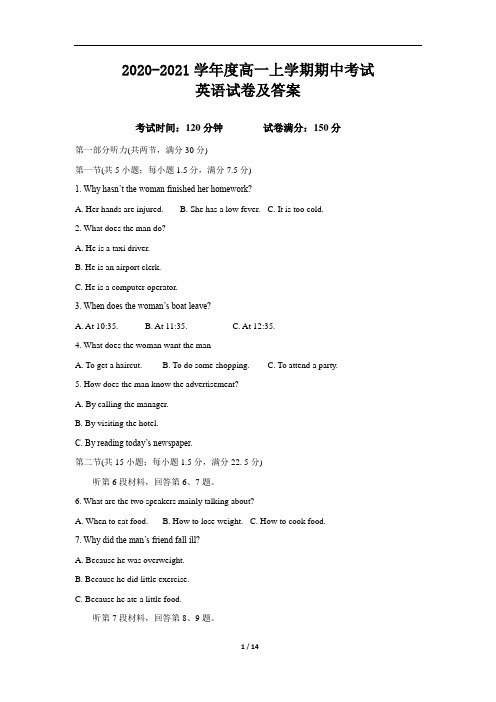
2020-2021学年度高一上学期期中考试英语试卷及答案考试时间:120分钟试卷满分:150分第一部分听力(共两节,满分30分)第一节(共5小题;每小题1.5分,满分7.5分)1. Why hasn’t the woman finished her homework?A. Her hands are injured.B. She has a low fever.C. It is too cold.2. What does the man do?A. He is a taxi driver.B. He is an airport clerk.C. He is a computer operator.3. When does the woman’s boat leave?A. At 10:35.B. At 11:35.C. At 12:35.4. What does the woman want the manA. To get a haircut.B. To do some shopping.C. To attend a party.5. How does the man know the advertisement?A. By calling the manager.B. By visiting the hotel.C. By reading today’s newspaper.第二节(共15小题;每小题1.5分,满分22. 5分)听第6段材料,回答第6、7题。
6. What are the two speakers mainly talking about?A. When to eat food.B. How to lose weight.C. How to cook food.7. Why did the man’s friend fall ill?A. Because he was overweight.B. Because he did little exercise.C. Because he ate a little food.听第7段材料,回答第8、9题。
2020-2021 学年高一上学期期中考试英语试卷(新高考)(浙江版)
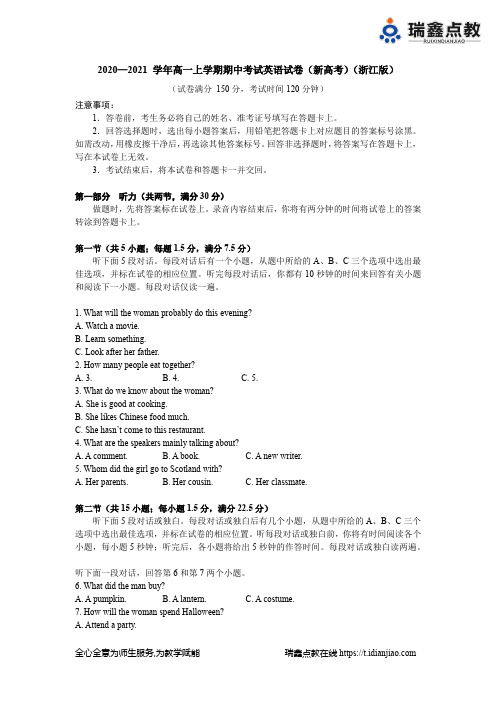
2020—2021 学年高一上学期期中考试英语试卷(新高考)(浙江版)(试卷满分150分,考试时间120分钟)注意事项:1.答卷前,考生务必将自己的姓名、准考证号填写在答题卡上。
2.回答选择题时,选出每小题答案后,用铅笔把答题卡上对应题目的答案标号涂黑。
如需改动,用橡皮擦干净后,再选涂其他答案标号。
回答非选择题时,将答案写在答题卡上,写在本试卷上无效。
3.考试结束后,将本试卷和答题卡一并交回。
第一部分听力(共两节,满分30分)做题时,先将答案标在试卷上。
录音内容结束后,你将有两分钟的时间将试卷上的答案转涂到答题卡上。
第一节(共5小题;每题1.5分,满分7.5分)听下面5段对话。
每段对话后有一个小题,从题中所给的A、B、C三个选项中选出最佳选项,并标在试卷的相应位置。
听完每段对话后,你都有10秒钟的时间来回答有关小题和阅读下一小题。
每段对话仅读一遍。
1. What will the woman probably do this evening?A. Watch a movie.B. Learn something.C. Look after her father.2. How many people eat together?A. 3.B. 4.C. 5.3. What do we know about the woman?A. She is good at cooking.B. She likes Chinese food much.C. She hasn’t come to this restaurant.4. What are the speakers mainly talking about?A. A comment.B. A book.C. A new writer.5. Whom did the girl go to Scotland with?A. Her parents.B. Her cousin.C. Her classmate.第二节(共15小题;每小题1.5分,满分22.5分)听下面5段对话或独白。
浙江省2020-2021学年高一上学期最新期中英语试卷精选汇编:阅读理解专题
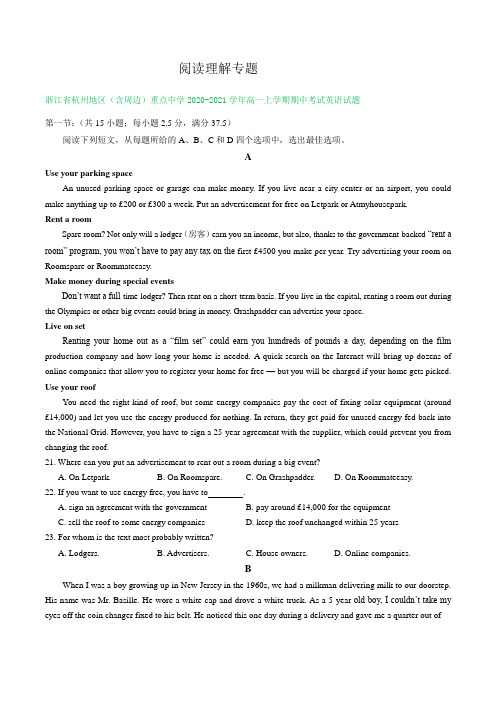
阅读理解专题浙江省杭州地区(含周边)重点中学2020-2021学年高一上学期期中考试英语试题第一节:(共15小题;每小题2.5分,满分37.5)阅读下列短文,从每题所给的A、B、C和D四个选项中,选出最佳选项。
AUse your parking spaceAn unused parking space or garage can make money. If you live near a city center or an airport, you could make anything up to £200 or £300 a week. Put an advertisement for free on Letpark or Atmyhousepark.Rent a roomSpare room? Not only will a lodger(房客)earn you an income, but also, thanks to the government-backed “rent a room” program, you won’t have to pay any tax on the first £4500 you make per year. Try advertising your room on Roomspare or Roommateeasy.Make money during special eventsDon’t want a full-time lodger? Then rent on a short-term basis. If you live in the capital, renting a room out during the Olympics or other big events could bring in money. Grashpadder can advertise your space.Live on setRenting your home out as a “film set” could earn you hundreds of pounds a day, depending on the film production company and how long your home is needed. A quick search on the Internet will bring up dozens of online companies that allow you to register your home for free — but you will be charged if your home gets picked. Use your roofYou need the right kind of roof, but some energy companies pay the cost of fixing solar equipment (around £14,000) and let you use the energy produced for nothing. In return, they get paid for unused energy fed back into the National Grid. However, you have to sign a 25-year agreement with the supplier, which could prevent you from changing the roof.21. Where can you put an advertisement to rent out a room during a big event?A. On Letpark.B. On Roomspare.C. On Grashpadder.D. On Roommateeasy.22. If you want to use energy free, you have to .A. sign an agreement with the governmentB. pay around £14,000 for the equipmentC. sell the roof to some energy companiesD. keep the roof unchanged within 25 years23. For whom is the text most probably written?A. Lodgers.B. Advertisers.C. House owners.D. Online companies.BWhen I was a boy growing up in New Jersey in the 1960s, we had a milkman delivering milk to our doorstep. His name was Mr. Basille. He wore a white cap and drove a white truck. As a 5-year-old boy, I couldn’t take my eyes off the coin changer fixed to his belt. He noticed this one day during a delivery and gave me a quarter out ofhis coin changer.Of course, he delivered more than milk. There was cheese, eggs and so on. If we needed to change our order, my mother would pen a note —“Please add a bottle of buttermilk next delivery” — and place it in the box along with the empty bottles. And then, the buttermilk would magically (魔术般)appear.All of this was about more than convenience. There existed a close relationship between families and their milkmen. Mr. Basille even had a key to our house, for those times when it was so cold outside that we put the box indoors, so that the milk wouldn’t freeze. And I remember Mr. Basille from time to time taking a break at our kitchen table, having a cup of tea and telling stories about his delivery.There is sadly no home milk delivery today. Big companies allowed the production of cheaper milk, thus making it difficult for milkmen to compete. Besides, milk is for sale everywhere, and it may just not have been practical to have a delivery service.Recently, an old milk box in the countryside I saw brought back my childhood memories. I took it home and planted it on the back porch(门廊). Every so often my son’s friends will ask what it is. So I start telling stories of my boyhood, and of the milkman who brought us friendship along with his milk.24. Mr. Basille gave the boy a quarter out of his coin changer to .A. show his magical powerB. pay for the deliveryC. satisfy his curiosityD. please his mother25. What can be infer red from the fact that the milkman had the key to the boy’s house?A. He wanted to have tea there.B. He was a respectable person.C. He was treated as a family member.D. He was fully trusted by the family.26. Why does home milk delivery no longer exist?A. Nobody wants to be a milkman now.B. It has been driven out of the market.C. Its service is getting poor.D. It is not allowed by law.27. Why did the author bring back home an old milk box?A. He missed the good old days.B. He wanted to tell interesting stories.C. He needed it for his milk bottles.D. He planted flowers in it.CThe day Madelyn McClarey’s twin sons, Aaron and Aubrey Hough, each received scholarships(奖学金)to Florida A&M University, she figured that after they moved seven hours north from Hollywood to Tallahassee, she’d be lucky to see them on weekends.But her sons had something else in mind. The twins told her they’d move to Tallahassee on one condition. She had to go with them—and work toward the colle ge degree she’d always wanted. And that is how McClarey ended up in a green cap and gown this month at FAMU. Cheering her on were her twins. “Our mom is so determined and dedicated, we’re lucky to have her as our mother,” said Aaron. “It was a lot of hard work, but she never gave up.”McClarey’s sons jumped as she was awarded a bachelor’s degree (学士学位)in English with a minor in education, excited that their mom finally had the degree she’d dreamed about for more than twenty years. Her professional goals were put on hold when she became a single mom looking after two kids. Before motherhood, before divorce, McClarey had gone to business school.McClarey, who described herself as “40ish,” said that when her sons insisted she go with them to college four years ago, her jaw dropped, having known most teens are eager to start lives away from their parents once they graduate from high school. She said, “But I was also delighted when I realized they weren’t joking and weren’t going to leave home unless I moved with them, so I said, ‘Well, all right—let’s go, then.’”Now that McClarey has graduated, she doesn’t plan to leave Tallahassee anytime soon. She wants to stick around to encourage and support her sons, but there is also another matter to deal with. “My goal is to become an author someday,” she said. “So this summer, I’ll be working on getting my master’s degree.”28. After being admitted to university, the twin sons wanted their mom to .A. move to TallahasseeB. see them on weekendsC. live with them in collegeD. continue her college education29. What does the underlined phrase “put on hold” in Paragraph 3 mean?A. To be done later.B. To be improved.C. To be taken off.D. To be set up.30. How did McClarey feel when hearing her sons’ suggestio n four years ago?A. Surprised.B. Delighted.C. Disappointed.D. Anxious.31. What would McClarey do after graduation?A. Find a job as a writer.B. Realize her dream.C. Deal with important matters.D. Move back to Hollywood.DIn early twentieth-century France, a new form of entertainment was becoming a hit— motion picture. People crowded into theatres for short, silent, black-and-white films that showed everyday happenings, such as a train pulling into a station. These pictures were dimly projected(投射)onto white sheets. Usually, there was no sound. Sometimes, men at pianos played music to match the scenes.Moving images in theatres are no longer new, but back at the beginning of the art form, surprises lurked(潜伏)around every corner. During the first showings of basic silent movies, some people in the audience screamed in fear, reacting to what they saw as if it were happening in real life. Moviegoers were known to leap out of the way of trains on the screen. At that time, few people understood what motion pictures were, so audience members could easily be fooled.Today, people crowd into theatres for the latest 3D movies. Even older movies, such as the popular Star Wars series, are being re-released in 3D. Moviemakers are excited about the ability to involve the audience more directly in the story or film. In addition, theatres spend tens of thousands of dollars on high-quality audio systems so that everything from the safest whispers to the largest explosions sounds clear and realistic.What will movies be like 100 years from now? Will audiences be able to smell scents in the films, taste the food that characters are eating, or even becoming part of the stories themselves? Only time will tell.32. What does the underlined word “hit” in paragraph 1 proba bly mean?A. A heavy blow.B. A crowded place.C. Something very popular.D. Something very touching.33. The author mentioned moviegoers leaping out of their seats to show .A. how foolish audiences wereB. how different old theatres wereC. how scary movies from the past wereD. how unfamiliar movies were to viewers then34. Why do theatres spend a lot on high-quality audio systems?A. To re-release more old movies.B. To develop movie technologies.C. To improve movies’ sound quality.D. To get audiences involved in the story.35. What’s the author’s purpose in writing the text?A. To explain how realistic movies are today.B. To tell something about future movie plans.C. To compare movie theatres over the last century.D. To introduce the development of movie technology.第二部分:阅读A21. C 细节理解题【解题思路】根据第段三段小标题Make money during special events.和最后一句话:Grashpadder can advertise your space.22. D 细节理解题【解题思路】根据最后一段最后一句话:However, you have to sign a 25-year agreement with the supplier, which could prevent you from changing the roof.23. C主旨大意题【解题思路】整篇文章讲了如何租房赚钱。
- 1、下载文档前请自行甄别文档内容的完整性,平台不提供额外的编辑、内容补充、找答案等附加服务。
- 2、"仅部分预览"的文档,不可在线预览部分如存在完整性等问题,可反馈申请退款(可完整预览的文档不适用该条件!)。
- 3、如文档侵犯您的权益,请联系客服反馈,我们会尽快为您处理(人工客服工作时间:9:00-18:30)。
浙江省A9协作体2020学年高一第一学期期中联考英语试题命题:普陀中学王娉娉、陈松审题:慈溪实验高级中学阮红梅桐乡凤鸣高级中学朱红校稿:陈霞考生须知:1. 本卷满分150分,考试时间120分钟;2. 答题前,在答题卷指定区域填写班级、姓名、考场号、座位号及准考证号并填涂相应的数字;3. 所有答案必须写在答题卷上,写在试卷上无效;4. 考试结束后,只需上交答题卷。
第Ⅰ卷选择题部分第一部分:听力(共两节,满分30分)第一节:(共5小题;每小题1.5分,满分7.5分)听下面5段对话。
每段对话后有一个小题,从题中所给的A、B、C三个选项中选出最佳选项。
听完每段对话后,你都有10秒钟的时间来回答有关小题和阅读下一小题。
每段对话仅读一遍。
例:How much is the shirt?A. £19.15.B. £9.15.C. £9.18.答案是B。
1. What will the man do first tomorrow afternoon?A. Move house.B. Watch a soccer match.C. Help the woman clean up.2. What time is it now?A. 9:20.B. 9:30.C. 9:45.3. Where has the woman been?A. To Spain.B. To France.C. To Germany.4. How will the woman go to the game?A. On foot.B. By bus .C. By car.5. What is the relationship between Nick and the woman?A. Classmates.B. Father and daughter.C. Brother and sister.第二节:(共15小题;每小题1.5分,满分22.5分)听下面5段对话或独白。
每段对话或独白后有几个小题,从题中所给的A、B、C三个选项中选出最佳选项。
听每段对话或独白前,你将有时间阅读各个小题,每小题5秒钟;听完后,各小题将给出5秒钟的作答时间。
每段对话或独白读两遍。
听第6段材料,回答第6、7题。
6. What are the speakers talking about?A. The man’s working experience.B. The man’s new job offer.C. The situation of the job market.7. How did the man get the new job?A. It was offered by his friend.B. It was offered by his college.C. It was offered in a newspaper.听第7段材料,回答第8至10题。
8. What has the boy begun to learn about in the geography class now?A. The sea.B. Rivers.C. Fish.9. What did the boy do in the geography class?A. He drew a picture.B. He watched a film.C. He read the textbook.10. What does the girl think of the homework of this week?A. It is easier.B. It is more interesting.C. It is harder.听第8段材料,回答第11至13题。
11. When were the wooden houses built?A. In the 13th century.B. In the 10th century.C. In the 17th century.12. Where did the man have lunch?A. On a hill.B. By a river.C. In a garden.13. How was the weather during the man’s trip?A. Sunny.B. Rainy.C. Windy.听第9段材料,回答第14至16题。
14. What is the topic of the photos of this year?A. Flowers.B. Animals.C. Food.15. How should the photos be sent?A. By e-mail.B. In person.C. By post.16. What is the prize?A. A cup.B. Some money.C. A camera.听第10段材料,回答第17至20题。
17. What is the first job of the day?A. To check the notice.B. To clean the animals’ places.C. To feed the animals.18. What time does the work finish in the zoo?A. At 6 p.m.B. At 8 p.m.C. At 7 p.m.19. How can visitors know about their favorite animals?A. By reading the notice.B. By listening to the talks.C. By asking the workers.20. What can we learn about the zoo?A. There is a restaurant in it.B. Three gift shops in it are open the whole year.C. Drinks and food can be bought in it.第二部分:阅读理解(共两节,满分35分)第一节:(共10小题;每小题2.5分,满分25分)阅读下列短文,从每题所给的A、B、C和D四个选项中,选出最佳选项。
AIn 1860, a Chinese functionary (公职人员)in Paris saw something that no Chinese had ever seen before: “On avenues, people ride on a vehicle with only two wheels which are held together by a pipe. They dash along like galloping(飞驰的)horses.” Thi s strange vehicle was, of course, a bicycle. One hundred years later, Chinese by the millions would be riding like “galloping horses” and the country would be known as the “Bicycle Kingdom”.Things change, however. As China has gotten richer, “car culture” has replaced “bicycle culture”. In the 1990s, there were 670 million bicycles in China. Today, there are only 120 million, but efforts are being made to get people back on their bikes in order to improve their health and the environment.Beijing has built a 6.5-kilometer “bicycle highway” so that riders won’t have to deal with the dangers of riding on car-crowd ed city streets. And Zhejiang province plans to build 10,000 kilometers of “green cycle paths” for commuters. Shanghai is trying to make bike ridin g more popular by having an annual Tour de France Shanghai competition with professional riders from around the world.I have always thought of bicycles as personal freedom vehicles. The Chinese word zixingche does carry that meaning. You can go anywhere you want to, whenever y ou want to. You don’t have to buy gas or charge the battery. You don’t have to wait for the bus or ask your parents for a ride in the car. You just get on your bike and go. And, as you pedal along lovely tree-lined streets, you can feel your body working and getting stronger and healthier.As the COVID-19 pandemic continues to cause concern, I’m looking forward to the reemergence(重现)of China’s cycling scene, as a means of recreation(娱乐;消遣). People hop on bikes in the wind, not to get to and from work, but just to hang out around town, especially on a clear spring or autumn afternoon.21. Why does the number of Chinese people cycling become smaller today?A. It is not free enough to cycle.B. Riding a bike is very dangerous.C. More people can afford to buy cars.D. Riding a bike is not as fast as riding a horse.22. The third paragraph is written in order to .A. show that big cities are very crowdedB. suggest that China is trying to support bike-ridingC. give some examples that cities are better places to ride a bikeD. tell us that Shanghai has more professional riders than Beijing23. From the last paragraph, we can know that .A. the writer likes bike-ridingB. cycling is a good way to enjoy lifeC. riding gives us a sense of freedomD. cycling is a good way to fight diseaseBFang Husheng is a bright, lively, 82-year-old woman from Beijing who is learning to use a smartphone, but it’s been a struggle. “Technology advances so fa st. What is supposed to make life easier is instead causing problems for us old people,” she says.Fang grew up in a simpler age when you had to actually leave your house to shop, buy a train ticket or make a doctor’s appointment. Now all of these things can be done with a smartphone and, in some cases, only with a smartphone. Recently an elderly man in Dalian was unable to travel on the subway because, to enter the subway, his QR health code needed to be scanned. “What is a QR code?” the man asked. “I hav e money to buy a ticket, why do I need a smartphone?” In the end, he left the station, feeling confused and embarrassed.I can certainly sympathize with (同情) Fang and the man from Dalian. They have spent their entire lives contributing to society and now they feel excluded from that society. But what can be done? One group of volunteer college students is trying to help. T hey are called See Young and they help the elderly learn how to use smartphones. However, teaching old folks about smartphones is only one part of the problem.Many older people have physical and health issues. Poor eyesight makes reading characters on small screens difficult. And “leathery fingers” (it means their fingers are less sensitive) make it hard to use touch screens.There are about 255 million elderly people in China and by 2030, one quarter of the population will be over 60 years of age. New technology and new solutions are going to be needed to make sure that these old folks aren’t left by the side of the road as the rest of society races past.24. The first paragraph is used to .A. to show the fast development of technologyB. tell us the usage of a smartphoneC. de scribe the old woman’s situationD. attract the readers’ interest in the article25. Why didn’t the o ld man travel on the subway?A. He didn’t buy a ticket.B. He had no smartphone.C. He was not healthy enough.D. He didn’t want to be scanned.26. Wh ich of the following is the closest in meaning to the underlined phrase “feel excluded from”?A. feel ignored byB. feel focused on byC. feel respected fromD. feel kept out of27. What’s the main idea of the passage?A. Old people are slow to learn to use smartphones.B. There will be many more old people in the near future in China.C. Greater help should be provided to help the old learn new technology.D. Physical and health reasons make it difficult for the old to use new technology.CThe journey of self is often nothing more than an exercise in patience and in the management of expectations. Many years ago, I was getting ready to leave home for college. I had the hope that I could finally answer the questions that had been bothering me since the beginning days of my high school years: what did I want to do; who did I want to be; what would make my life truly meaningful? I felt certain that I would be picking up the answers along the way. And there was this belief that the me who had spent many a day thinking over such things would one day suddenly pop out from his chrysalis (蝶蛹)like a caterpillar (毛毛虫) does when it becomes a butterfly. But alas, my change from caterpillar to butterfly was like being stuck in an endless queue for a ride at a Disney park. It took me a long time to realize that there is no such thing as a fast-pass in life.——DaisyThe journey of self is often nothing more than a tug-of-war (拔河)match between who we see ourselves to be, and how others view us. I had been considerably shy growing up, and often had trouble talking with new people. This made my high school years even more difficult as I had moved from my hometown and had registered in three different high schools over that period of time. It was at this time that I started to follow my own interests and to better understand and develop my own sense of self. However, the self is in fact partly formed by how others see us. There is a natural tension (矛盾)between our inner sense of self, and how other people see us. The general rule is that the truer you remain to your internal sense of self, the more likely it is that people will like and admire you. ——Emily28. What does the underlined sentence mean?A. It’s not easy to understand oneself truly.B. The writer doesn’t like being kept waiting.C. The years the writer spent in the high school were long and hard.D. The experience of waiting in the park is an exercise in patience.29. According to Emily, which is the most important in the life journey?A. Staying true to oneself.B. Having one’s own interest.C. Understanding what others think of you.D. Enjoying experiences in different schools.30. What do Daisy and Emily have in common?A. Neither of them cares much about others.B. Neither of them had a happy high school life.C. Both of them took a negative attitude to high school life.D. Both of them reflect on their own life deep ly.第二节:(共5小题;每小题2分,满分10分)根据短文内容,从短文后的选项中选出能填入空白处的最佳选项。
